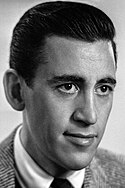J.D. Salinger Quote
But I'll tell you a terrible secret- Are you listening to me? There isn't anyone out there who isn't Seymour's Fat Lady. That includes your Professor Tupper, buddy. And all his goddam cousins by the dozens. There isn't anyone anywhere that isn't Seymour's Fat Lady. Don't you know that? Don't you know that goddam secret yet? And don't you know who the Fat Lady really is?...Ah, buddy. Ah, buddy. It's Christ Himself. Christ Himself, buddy.For joy apparently, it was all Franny could do to hold the phone, even with both hands.For a fullish minute or so, there were no other words, no further speech. Then: I can't talk any more, buddy. The sound of a phone being replaced in its catch followed.Franny took in her breath slightly but continued to hold the phone to her ear. A dial tone, of course, followed the formal break in the connection. She appeared to find it extraordinarily beautiful to listen to, rather as if it were the best possible substitute for the primordial silence itself. But she seemed to know, too, when to stop listening to it, as if all of what little or much wisdom there is in the world were suddenly hers. When she replaced the phone, she seemed to know just what to do next, too. She cleared away the smoking things, then drew back the cotton bedspread from the bed she had been sitting on, took off her slippers, and got into the bed. For some minutes, before she fell into a deep, dreamless sleep, she just lay quiet, smiling at the ceiling.
But I'll tell you a terrible secret- Are you listening to me? There isn't anyone out there who isn't Seymour's Fat Lady. That includes your Professor Tupper, buddy. And all his goddam cousins by the dozens. There isn't anyone anywhere that isn't Seymour's Fat Lady. Don't you know that? Don't you know that goddam secret yet? And don't you know who the Fat Lady really is?...Ah, buddy. Ah, buddy. It's Christ Himself. Christ Himself, buddy.For joy apparently, it was all Franny could do to hold the phone, even with both hands.For a fullish minute or so, there were no other words, no further speech. Then: I can't talk any more, buddy. The sound of a phone being replaced in its catch followed.Franny took in her breath slightly but continued to hold the phone to her ear. A dial tone, of course, followed the formal break in the connection. She appeared to find it extraordinarily beautiful to listen to, rather as if it were the best possible substitute for the primordial silence itself. But she seemed to know, too, when to stop listening to it, as if all of what little or much wisdom there is in the world were suddenly hers. When she replaced the phone, she seemed to know just what to do next, too. She cleared away the smoking things, then drew back the cotton bedspread from the bed she had been sitting on, took off her slippers, and got into the bed. For some minutes, before she fell into a deep, dreamless sleep, she just lay quiet, smiling at the ceiling.
Related Quotes
About J.D. Salinger
The Catcher in the Rye (1951) was an immediate popular success; Salinger's depiction of adolescent alienation and loss of innocence was influential, especially among adolescent readers. The novel was widely read and controversial, and its success led to public attention and scrutiny. Salinger became reclusive, publishing less frequently. He followed Catcher with a short story collection, Nine Stories (1953); Franny and Zooey (1961), a volume containing a novella and a short story; and a volume containing two novellas, Raise High the Roof Beam, Carpenters and Seymour: An Introduction (1963). Salinger's last published work, the novella Hapworth 16, 1924, appeared in The New Yorker on June 19, 1965.
Afterward, Salinger struggled with unwanted attention, including a legal battle in the 1980s with biographer Ian Hamilton and the release in the late 1990s of memoirs written by two people close to him: Joyce Maynard, an ex-lover; and his daughter, Margaret Salinger.
